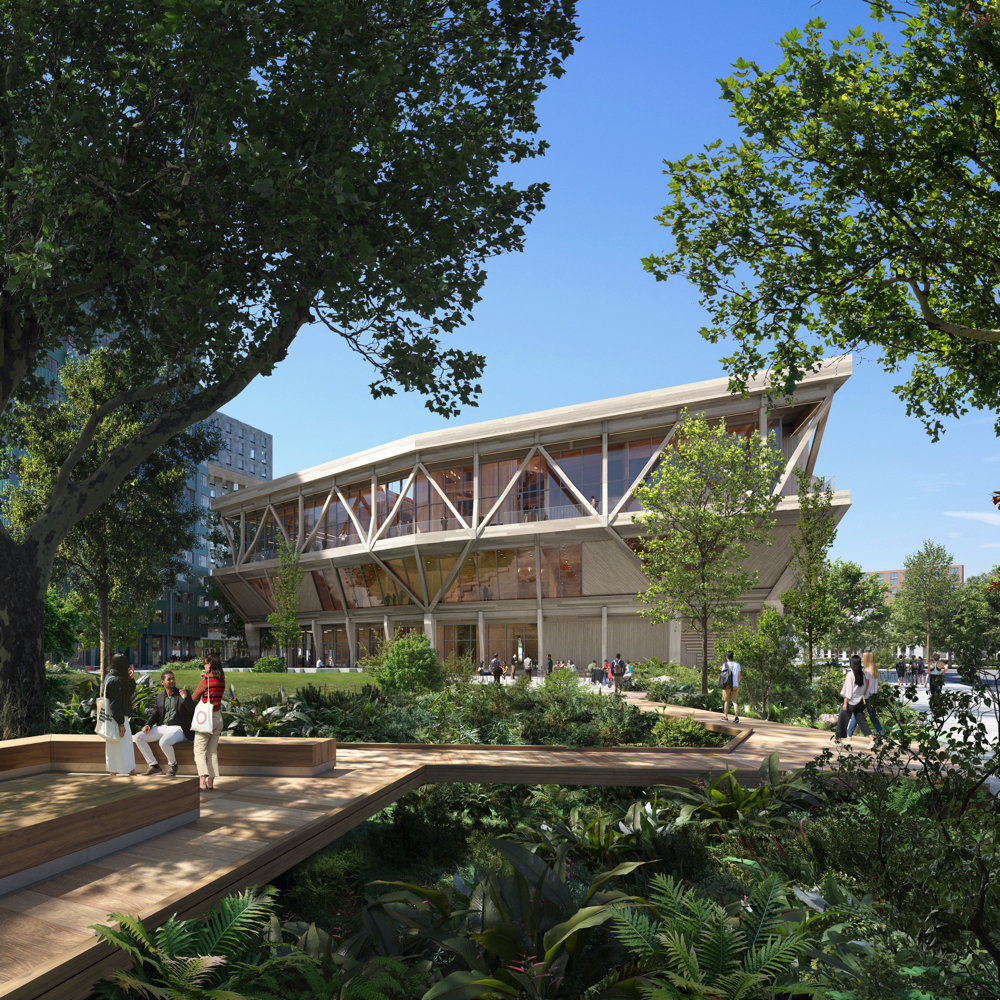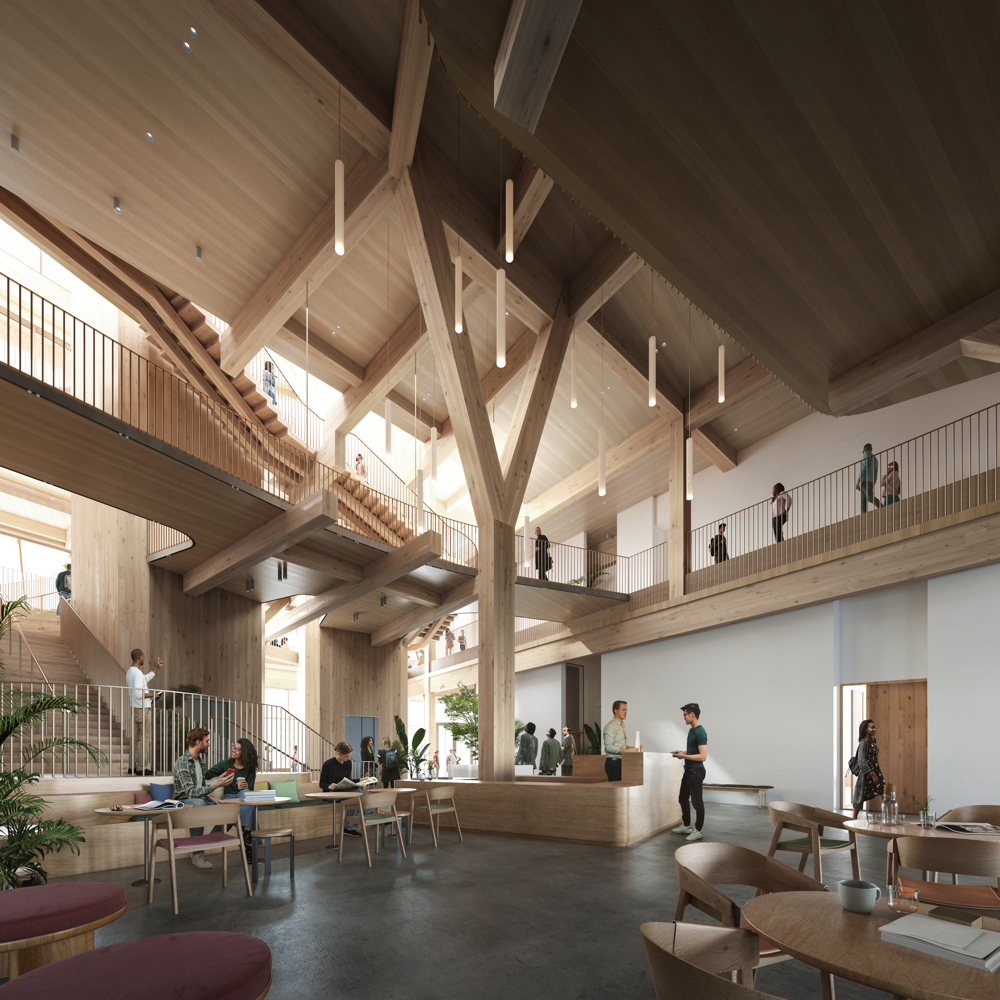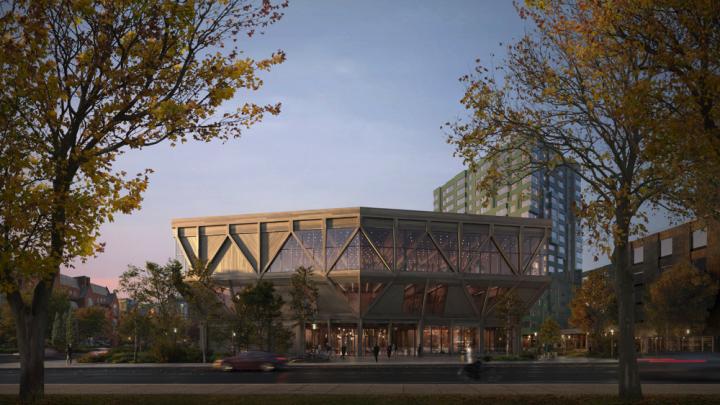Harvard announced on December 14 the creation of its first University-wide conference center, which will serve as a gateway to its planned enterprise research campus (ERC) on Western Avenue in Allston. The timber-framed venue will be named the David Rubenstein Treehouse in recognition of Harvard Corporation member David Rubenstein, a co-founder and former co-CEO of private equity and investment management firm the Carlyle Group, and a former co-chair of The Harvard Campaign for the University, the Harvard Kennedy School (HKS), and Harvard Business School (HBS). A gift from Rubenstein will support the creation of the center.
Designed by Studio Gang, the architecture and urban design firm headed by Jeanne Gang, M. Arch. ’93, the conference center will include several flexible gathering spaces above a public ground floor. In a statement, the University said that the center will become “a focal point for programs ranging from international summits to alumni events, conference receptions, and workforce recruiting activities,” and also serve as a resource for Harvard’s burgeoning executive education programs. The structure will be the only Harvard-operated facility in the ERC, which will include a mix of residential buildings, office and lab space, and a hotel, restaurants, and retail businesses. As such, this venue is expected to become a place that will bridge the academic and commercial worlds, creating a space where faculty and students can meet and collaborate with industry partners and visitors.

The conference center as envisioned from the greenway within the enterprise research campus
Rendering courtesy of Studio Gang
In its construction materials (principally wood) and operations, the building anticipates a fossil-free future, running entirely on electricity. Roof-mounted solar panels will provide an alternative source of electricity, while the bulk of the building’s power needs will be met by Harvard’s District Energy Facility, which is located within the bounds of the ERC. The building’s roof and bioswales in the surrounding landscape will harvest rainwater, according to the University statement—presumably to irrigate the surrounding landscape plantings.
Discussing the building’s design echo of a treehouse, architect Jeanne Gang noted that its “visible mass timber columns and beams emphasize the branching structure—you can see the ‘V’-shaped columns extending out, and the diagonals of the cross-bracing reach all the way to the roof, becoming finer the higher they rise.” The upper levels thus “feel almost suspended within the surrounding tree canopy, like being in a tree house,” she continued: “a very special destination… with natural daylight, great views, and a balcony where you can step outside and look out over the landscape and the campus.”

An interior rendering of the planned conference center
Rendering courtesy of Studio Gang
President Lawrence S. Bacow noted in the statement that he and Rubenstein “have had many wonderful conversations about Allston’s role in Harvard’s future. With this generous gift to support a world-class conference center, he is helping to bring together entrepreneurship, innovation, and research for the benefit of everyone. I am not surprised that such a great friend and leader would be so supportive of a university that he has supported in so many ways. David is a true friend—to Harvard and to me—and I am deeply grateful.”
Rubenstein said that he is “honored to help Harvard with a conference center that will serve as a convening place for academic and business visitors, as well as Harvard faculty and students, at the exciting new enterprise research campus….”
Rubenstein has a long history of philanthropy to Harvard and numerous other nationally important institutions. At HKS, his gift helped enable the construction of the David Rubenstein Building, which houses the Center for International Development; he also supports the school’s efforts to recruit preeminent scholars and leading practitioners, and created a fellowship that funds students in the HKS/HBS joint-degree program. Another fund in his name supports HBS’s Immersion Experience Program for M.B.A. students.
Rubenstein’s extensive philanthropic endeavors include service as chairman of the board of trustees of the John F. Kennedy Center for the Performing Arts, the Smithsonian Institution, and the Council on Foreign Relations. Among other activities, he is a trustee of The National Gallery of Art, Johns Hopkins Medicine, University of Chicago, Memorial Sloan-Kettering Cancer Center, the Lincoln Center for the Performing Arts, the Institute for Advanced Study, the Brookings Institution, and the World Economic Forum. He is also widely known for his transformational gifts for the restoration or repair of several of the nation’s monuments and buildings, including the Lincoln Memorial, Jefferson Memorial, Monticello, Montpelier, Mount Vernon, Washington Monument, Arlington House, Iwo Jima Memorial, Kennedy Center, Smithsonian, National Archives, National Zoo, Library of Congress, and National Museum of African American History and Culture.








